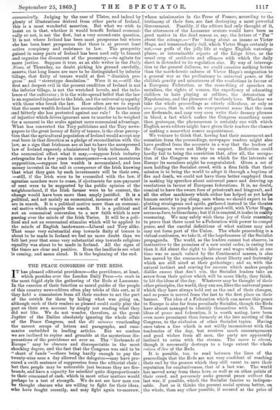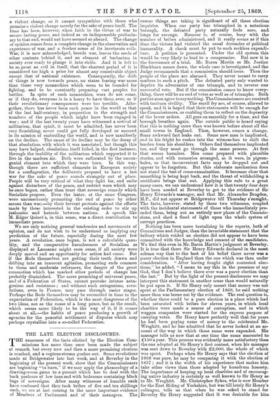THE PEACE CONGRESS OF THE REDS.
IT has pleased editorial providence—the providence, at least, which presides over the London Daily Press—to snub in the most frigid style the gathering of the Reds at Lausanne. In the exercise of their function as moral guides of the people of this country news-editors often play tricks of this sort, as if they held a commission from all their readers to act the part of the ostrich for them by hiding what was going on, although such of their readers as pleased could easily play the part on their own account by simply not reading what they did not like. We do not wonder, therefore, at the great Jupiter of the Dailies absolutely ignoring the whole affair of the Peace Congress, and the dii ininores vouchsafing the merest scraps of letters and paragraphs, and sum- maries embedded in leading articles. But we confess we are inclined to repine and grumble at the mysterious dis- pensations of the providence set over us. The "firebrands of Europe" may be obscure and disrespectable in the most shocking degree, and the fact that the Congress was said to be -" short of funds "—there being hardly enough to pay the twenty-nine sons a day allowed the delegates—may have pro- cured a swift sentence of suppression from the editorial chair ; but then people may be noticeable just because they are fire- 'brands, and have a capacity for mischief quite disproportionate -to their command of cash, which in most other matters would perhaps be a test of strength. We do not see how men can 'be thought obscure who are willing to fight for their ideas, 'who have fought recently, and may fight again to-morrow, whose missionaries in the Press of France, according to the testimony of their foes, are fast destroying a most powerful Government. Possibly, if the editors had only thought of it, the utterances of the Lausanne orators would have been as good matter in the dead season as, say, the letters of "Par" about the coinage,—" Par" being about as insane as Victor Hugo, and transcendently dull, which Victor Hugo certainly is not,—or puffs of the jolly life at vulgar English watering- places, or interminable reports of the Liege fetes, or the usual crop of accidents and offences with which the daily sheet is distended to its regulation size. By way of interrup- tion to the general dullness, we could conceive nothing better than the mock-heroic sadness of Victor Hugo's resignation to a general war as the preliminary to universal peace, or the childish gravity and minuteness of the resolutions in favour of a European Federation, or the cross-firing of speeches on socialism, the rights of women, the expediency of educating children to hate playing at soldiers, the detestation of Napoleonism, and the pleasures of brotherly love. Whether we take the whole proceedings as utterly ridiculous, or only so cum gran°, that is, with an ever-present sense that the men are firebrands, and may very soon write their dreamy phrases in blood, a fact which makes the Congress something more than grotesque, the phenomenon is certainly one with which English news editors might have given their readers the chance of making a somewhat nearer acquaintance.
We venture to think that, having had their amusement and sensation from the proceedings, newspaper readers might also have profited from the accounts in a way that the leaders of the Congress were not likely to suspect. Reflection could hardly fail to bring the conviction that, after all, the occupa- tion of the Congress was one on which for the interests of Europe its members might be congratulated. Given a set of men holding the Socialist creed, with a firm faith that their mission is to bring the world to adopt it through a baptism of fire and death, we could not have them better employed than in making big speeches about universal peace and drawing up resolutions in favour of European federations. It is, no doubt, comical to have the sworn foes of priesteraft and kingeraft, and all the other machinery which either has helped or yet helps human society to jog along, men whom we should expect to be plotting stratagems and spoils, gathered instead in the theatre of Lausanne, to preach peace and good-will, with Victor Hugo, serene as Jove, tobless them; but if it is comical, it is also in reality reassuring. We may safely wish them joy of their reasoning to prove that there must be a Federation with power to compel peace, and the careful definitions of what nations may and may not form part of the Union. The whole proceeding is a virtual confession, we take it, of the hopelessness of the Socialist propaganda. The world, as the leaders cannot but observe, is inattentive to the promises of a new social order, is caring less than it did about the right to labour and wages which at one time was so much valued by the Continental masses, is also less moved by the common-places about liberty and fraternity which are still aired at their gatherings ; and so, with the natural instinct and craving for success which makes people dislike causes that don't win, the Socialist leaders take an arrow from their quiver which will be more likely, they think, to hit the ideas of the day. Whatever may be thought of their other principles, the world, they can see, likes the universal peace which they have always held out as the end of their changes, and so peace is moved from the last to the first place on their banner. The idea of a Federation which can assure this peace to Europe is also far from peculiarly Socialist, though the Reds have almost managed to identify themselves with it. These ideas of peace and federation, it is worth noting, have been even more prominent than formerly at the late meeting of the Congress, to the exclusion of other Socialist topics. Having once taken a line which is not wildly inconsistent with the tendencies of the day, but receives much encouragement and good wishes from all men, the party are apparently inclined to swim with the stream. The move is clever, though it necessarily destroys to a large extent the whole raison (rare of the Reds.
It is possible, too, to read between the lines of the proceedings that the Reds are not very confident of reaching their end by the process which they still vaunt to save their reputation for combativeness, that of a last war. The world has moved away from them here, as well as on other points of their creed, and perversely seeks general peace without the last war, if possible, which the Socialist fancies so indispen- sable. Just as it thinks the present social system better, on the whole, than any other possible, if secured at the price of a violent change, so it cannot sympathize with those who promise a violent change merely for the sake of peace itself. The time has been, however, when faith in the virtue of war to secure lasting peace, and indeed as an indispensable prelimin- ary to that end, would not have seemed so absurd. The change of opinion comes from a complete change in the observation and experience of war, and a fresher sense of its inveterate evils. War, it is now acknowledged, breeds war, leaves the seeds of other contests behind it, and an element of barbarism in society ever ready to plunge it into strife. And it is felt to be so great an evil in itself, that the shortest period of it is considered too high a price for almost any conceivable object except that of national existence. Consequently, the drift of things is now towards peace, no states fearing war more than those very monarchies which seem to be founded for fighting, and to be constantly preparing vast peoples for battles. In spite of such monarchies, wars do not come, or if they do, everyone is in a hurry to have them over, as if their revolutionary consequences were too terrible. Alto- gether, there has never been such peace in the world as that of the last half-century, in proportion to the strength and numbers of the people which might have been engaged in war ; and if the last twenty years have witnessed a revival of militarism, that spirit, it must be admitted, has never been very flourishing, never could get fully developed or succeed in its mission of embroiling the world, and is now manifestly on the decline. The cause of its decline may be the decay of that absolutism with which it was associated, but though this may have helped, absolutism itself failed, in the first instance, through the inability of the militarism which supported it to live in the modern air. Both were suffocated by the uncon- genial element into which they were born. In this way, though there are sufficient elements in European society for a conflagration, the deliberate proposal to have a last war for the sake of peace sounds strangely out of place. People will be very critical of what they fight for, and unite against disturbers of the peace, and restrict wars which may be once begun, rather than trust that sovereign remedy which Socialists propose. Even the latter, at the same Congress, were unconsciously promoting the end of peace by other means than war,—by their fervent protests against the efforts made by those interested in the existing order to stir up jealousies and hatreds between nations. A speech like M. Edgar Quinet's, in this sense, was a direct contribution to immediate peace.
We are only noticing general tendencies and movements of opinion, and do not wish to be understood as implying any prediction of the future, especially during the next few years. A revolution, once begun, is not a calculable quan- tity, and the comparative harmlessness of Socialism as displayed at Lausanne might soon cease, if all society were deeply moved and an opportunity for action had come. But if the Reds themselves are getting their teeth drawn and drifting into an innocent agitation, promoting ends common to them and moderate reformers, the danger of the great commotion which has marked other periods of change has probably diminished. The mere preaching of universal peace, and of a Federation of States, cannot provoke intense anta- gonism and resistance ; and without such antagonism, revo- lutions, even in France, may pass through easier stages. Perhaps the Reds themselves may be reconciled in time to the expectation of Federation, which is the most dangerous of the two ideas, not as the cause of a long peace, but as the result, which seems more likely to be the way of it, if it comes about at all,—the habits of peace producing a growth of agencies for the peaceful settlement of disputes which may perhaps crystallize into a so-called Federation.































 Previous page
Previous page